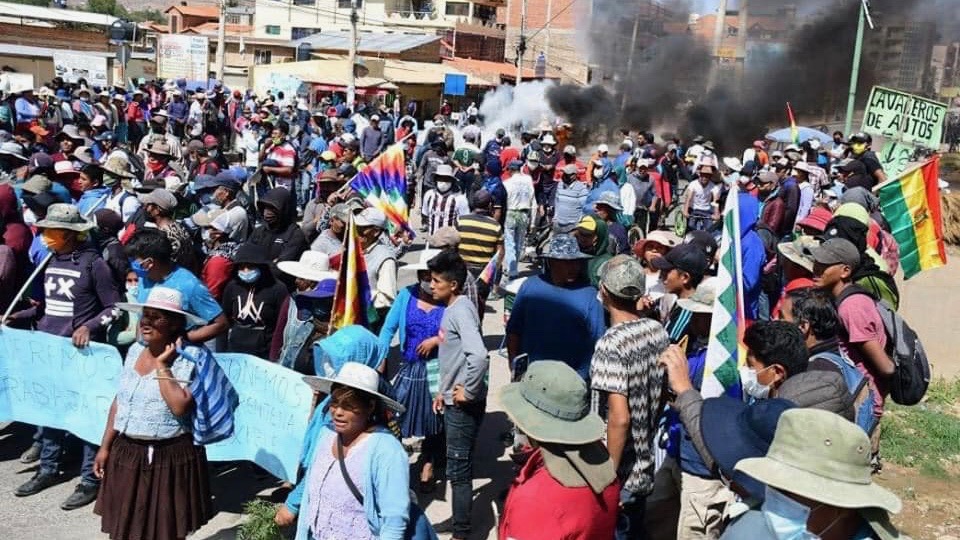The demonstrations against the government of self-proclaimed president Jeanine Áñez, which began in the working class district of K’ara K’ara in Cochabamba city on May 11, have multiplied across Bolivia. For the past ten days, thousands of Bolivians have been mobilizing, demanding that Áñez and government minister Arturo Murillo resign.
The protesters demand that the de-facto government respect the 90-day period established by the 2020 General Elections Postponement Law to hold of general elections in the country and that the Supreme Electoral Court (TSE) set a date for the elections as soon as possible.
They denounced the interim government for not providing sufficient food or economic aid to the poor and vulnerable population, and to the informal workers, who have lost their sources of income due to the coronavirus lockdown. Protesters demand that they be given permission to work, since strict quarantine measures oblige them to stay at home, without any assistance from the government.
Likewise, they demand that the Supreme Decree 4.232, which authorizes the use of genetically modified seeds, be immediately revoked. They argue that it is unconstitutional and violates the right to food security of Bolivians.
Last week, on May 14, the de-facto government was forced to annul the Decree 4.231, which imposed new limitations on freedom of expression and established their violation as a criminal offense, after receiving fierce national and international condemnation and rejection of the same.
On May 19 and May 15, the six months anniversaries of the massacre of Senkata in El Alto city and the massacre of Sacaba city in Cochabamba department respectively, were commemorated. The inhabitants and relatives of both the cities recalled the brutal military and police repression suffered by the Indigenous, working class communities and denounced Áñez for authorizing the use of deadly force against unarmed demonstrators. They also demanded an end to all forms of repression against social protests, something that has been constant under the rule of the coup regime led by Áñez which many characterize as fascist, neoliberal, patriarchal and racist.
19 November 2019: Families of Senkata massacre victims denounce @JeanineAnez and @ArturoMurilloS for authorizing the use of deadly force against unarmed demonstrators outside of the Senkata gas plant, killing 10. pic.twitter.com/efHolq6RDn
— Kawsachun News (@KawsachunNews) May 19, 2020
Today marks six months since the Huayllani-Sacaba massacre, the first massacre committed by coup authorities. Nine people were executed while calling for the restoration of Bolivia's democracy. @camilapress pic.twitter.com/EGfyXo6o2V
— Kawsachun News (@KawsachunNews) May 15, 2020
This past week, protesters blocked several roads and highways in the departments of La Paz, Cochabamba, Potosí, Oruro and Santa Cruz. The inhabitants of El Alto, K’ara K’ara and Potosí, since May 16, have been maintaining an constant blockade of roads and landfills in the cities, as a measure to demand compliance with their claims.
Corruption in the coup regime
Last week, a corruption scandal surfaced related to the purchase of ventilators to attend serious COVID-19 patients at an inflated price.
The coup regime purchased 170 ventilators from GPA INNOVA, a Spanish company, for the intensive care units in Bolivian hospitals. The shipment arrived in Bolivia on May 14. Two days after, on May 16, the Bolivian Society of Critical Medicine and Intensive Care reported that the devices did not meet the minimum requirements of the World Health Organization (WHO) and could not be used to attend emergencies.
In addition, the same day, the Bolivian Catholic University revealed that in the last two months they had offered the government to manufacture the equipment at an average cost of 1,000 USD per unit, far less than 27,683 USD per device, which the government paid to the Spanish company.
Besides, on May 18, the president of GPA Innova, Pau Sarsanedas, told local radio that he charged about 10,000 USD for each device and that the balance of what Bolivia paid could have gone to intermediaries.
Several opposition leaders, including presidential candidate Luis Arce of the Movement Towards Socialism (MAS), denounced the purchase of the ventilators as a fraud and demanded explanations from the coup regime’s head.
The coup regime paid 4.7 million USD for COVID-19 ventilators worth 1.2 million USD. It is not yet known which regime official organized the payment, or who the extra money was diverted to.
However, in response to the growing controversy in national and international media, the provisional president, on May 20, suspended health minister Marcelo Navajas due to the corruption scandal.
Navajas was later arrested. He is the owner of an elite private clinic and was appointed as health minister on April 8 by Añez.
In addition, local media reported that the coup regime officials have been using military planes as their personal taxi service to flout the lockdown and attend social events as millions of citizens go hungry.





